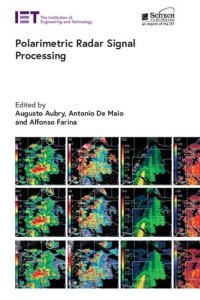
Ebook: Polarimetric Radar Signal Processing
- Genre: Technique // Electronics: Signal Processing
- Series: Radar Sonar and Navigation
- Year: 2023
- Publisher: Scitech Publishing
- City: London
- Language: English
- pdf
Polarimetric Radar Signal Processing provides an overview of advanced techniques and technologies developed for polarimetric radars to meet challenging performance requirements. It aims to cover some of the most challenging application fields, including: target detection for active and passive surveillance systems, interference suppression, detection of temporal changes in a given scene, environment classification, automatic target recognition, non-cooperative target imaging, polarimetric coding in radar and SAR systems, pol-SAR ambiguities suppression, space-debris detection, tracking, and classification, estimation of biological and behavioural parameters of insects, precipitations localization as well as type and motion parameters estimation via real-life practical polarimetric weather radar.
The book balances a practical point of view with a rigorous mathematical approach corroborated with a wealth of numerical case studies and real experiments. Additionally, the book has a cross-disciplinary approach as it aims to exploit cross-fertilization by the recent and latest research and discoveries in statistical signal processing theory and electromagnetism.
Each chapter is self-contained and is written by renowned researchers in polarimetric radar signal processing. The emphasis of the book is on both theoretical results and practical applications that clearly show the potential benefits in radar performance using polarimetric diversity in different application domains. Cross referencing and a common notation have been realized so that the related material as well as equations can be easily connected. This significantly enhances the book's value as a reference.
This book is addressed to systems engineers and their managers in civilian as well as defence companies. Technical staff in procurement agencies and their technical advisers. Students at MSc and PhD levels in signal processing, electrical engineering, systems and defence engineering, and any persons interested in applications of polarimetry theory to radar engineering.